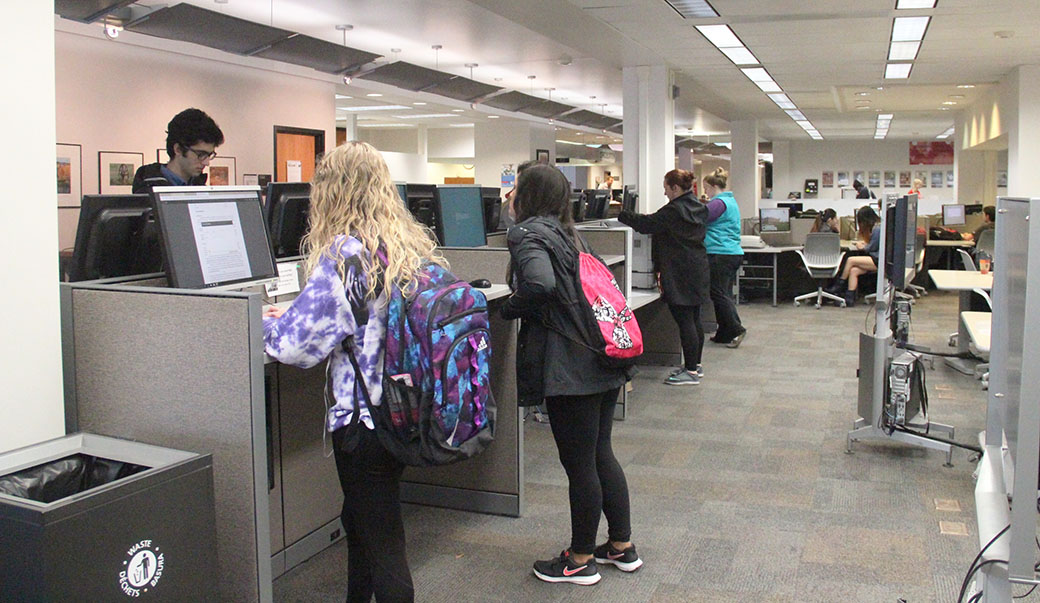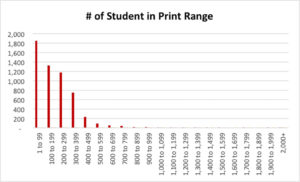
Printing on campus looks to continue improving student usage
During the last academic year alone more than one million sheets of paper have used in printing at the Academic Commons in the I.D. Weeks Library by students.
There are 839 printers on USD’s campus, according to a recent audit conducted by A&B Business Systems. Most of the printers are HP brand, and the models are replaced about every two years in the Academic Commons. The printers in other areas, since they aren’t as frequently used, aren’t replaced as often.
USD received roughly 1,300 cases, or 6,500,000 sheets, of paper during the 2015-16 academic school year, costing $46,000. Approximately $195,000 was spent on 2,800 cartridges on toner.
“The budget we have that pays for the supplies for those printers is the same budget that puts new computers in, upgrades wireless,” said Cheryl Tiahrt, assistant vice president of technology.
Since 2007, students at the University of South Dakota have been given a $28, or 400 sheets, printing quota. This allotment allows students to access their account, using Pharos Uniprint software, to print quickly and efficiently.
During the 2015-16 academic school year, 2,078 reams of paper, or 1,039,459 total pages, were used at the Academic Commons, according to Tiahrt. Around other Pharos printing sites at USD, more than 500 reams of paper, or 250,000 pages, were used.

According to Tiahrt, 91 percent of students print 400 sheets or less during the academic year with Pharos. Students print most frequently in the Academic Commons, using 200 out of 250 cases tracked in Pharos.
“Most campuses don’t have a printing quota at all,” Tiahrt said. “When I look at the stats, I wonder from a sustainability standpoint, would they print less?”
Morgan Huss, a lab consultant at the library, said there haven’t been many changes made at the Commons in terms of printing.
“I don’t have a lot of problems with (printing),” Huss said. “We don’t get a lot of complaints about it. We have a jam once in awhile, but nothing too big.”
When it comes to maintenance, the IT workers are the ones who assist with the Academic Commons printers. Other maintenance workers assist in other places using printing.
One new addition, however, is now being implemented to improve printing efficiency is Secure Release Anywhere.
“Let’s say you’re in your dorm room and you know you have to print an assignment,” Tiahrt said. “You can print it from your room and you can go to the Academic Commons, and one of the printers when you walk up, you can punch in (your printing job) and it gives it (to you). We think that might be a feature students will like.”
This Secure Release Anywhere will also benefit the recycling aspect, Tiahrt said. When it comes to sustainability, 3.5 percent of total printing, or more than 36,000 pages, is being wasted. This measures what is left at the printers only, and not throughout other recycling locations or trash bins.
“If we implement new features such as allowing students to print from anywhere and release their print job when they approach any printer, we can measure again and see if it reduces waste,” Tiahrt said.
The State of South Dakota negotiates the contracts for printers. USD receives printers from Hewlitt-Packard because “we get a good deal and if everybody in the state has the same model, then they give you a discount,” said Tiahrt.
Paper is purchased at office stores, and the paper is delivered every two weeks to the Academic Commons.
Besides using the computers in the Academic Commons labs, students can also print from their laptops.
Other places on campus that are utilizing Pharos Uniprint include University Housing labs, the School of Medicine, the Law School and the School of Business Lab in Beacom.
About 5,500 students utilized Pharos during the last school year.
Tiahrt said she hopes students are able to continue printing with their quota, and are able to utilize it well.
“I find it curious that so much printing happens,” Tiahrt said. “Is that where students would like to see that money go? That’s one question I have. If that’s the most important thing… then that’s OK with me.”


